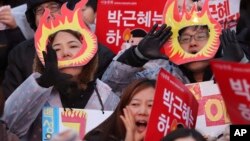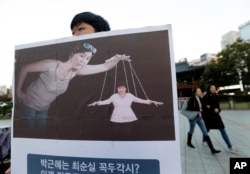Despite another weekend of massive protests in Seoul, and facing a possible impeachment vote that could come as early as this week, South Korean President Park Geun-hye remains secluded and isolated in the presidential Blue House.
On Monday, her lawyer Yoo Young-ha denied another request from government prosecutors to question the president this week about an influence peddling scandal involving a longtime confidant and close political aides.
“It is difficult as (President Park) is having a tight schedule ahead, including appointment of a special prosecutor and preparations for measures to control urgent state affairs," said Yoo in a written statement.
For the fifth consecutive week, massive peaceful protests were held throughout South Korea to demand that Park resign. Organizers estimated that nearly two million people rallied across the country with 1.5 million gathered in downtown Seoul. Police said the turnout in Seoul was closer to 270,000.
The South Korean president’s approval rating has dropped to just 4 percent and a recent poll found that 80 percent of South Koreans support her impeachment.
President Park has issued two public apologies since the scandal broke and there are reports that she may make a third public address this week.
Otherwise the president has remained withdrawn from public view. Last week she was absent from her weekly cabinet meeting and she did not attend the Asia Pacific economic leaders forum in Peru earlier this month.
While Park has denied involvement in any wrongdoings, her reclusive reaction to the growing scandal is reinforcing her guilt in the minds of the public.
“I’m really doubtful whether the president really understands what is really going on and what really the public thinks about this scandal,” said Younjae Kim, a political public relations consultant with One Public Strategies in Seoul.
Suspect
Also on Monday President Park accepted the resignation of Minister of Justice Kim Hyun-woong.
There were reports of tension between the Blue House and the Justice Ministry after Park was named a criminal subject last week in the investigation of the scandal being conducted by the Seoul Central District Prosecutor under the Justice Ministry.
The prosecution claims it has evidence proving Park’s involvement in illicit acts allegedly committed by her close friend Choi Soon-sil and former aide Ahn Jong-bum to force major Korean conglomerates to donate more than $65 million to two foundations using threats of tax audits.
On Sunday, prosecutors said President Park might have also conspired to pressure KT, the country’s second largest telecom company, to direct lucrative advertising contracts to Choi and her friends. Prosecutors said they have indicted Cha Eun-taek a K-pop video director and friend of Choi’s, and others involved, on charges of extortion, embezzlement an abuse of authority.
Choi has been charged with abuse of authority, coercion and attempted fraud for her part in the corruption scandal. Ahn faces similar charges and another presidential adviser was charged with leaking government secrets to Choi, who was allegedly influential in formulating government policy even though she held no official position or security clearance.
Independent counsel
President Park last week first reneged on her earlier promise to cooperate with the criminal probe into the corruption scandal. Calling the current investigation “biased,” the president’s spokesman said she will wait for the upcoming “impartial independent counsel” to be named by the National Assembly.
The opposition parties that control the National Assembly are expected to submit to the president the names of two candidates for independent counsel by Tuesday. The president will have until Saturday to choose between the two.
Critics argue the president is trying to delay the legal proceedings for as long as possible.
Impeachment
The dual investigations however have not slowed opposition leaders in the National Assembly.
The two largest opposition parties, the Democratic Party of Korea and the People’s Party, have indicated they will submit this week a joint impeachment motion that could be voted on by Friday.
Impeachment requires a two-thirds approval vote from the 300 member National Assembly.
To reach the 200 votes needed for impeachment, the 159 members of the two main opposition parties will need 41 votes from independent lawmakers and from Park’s ruling Saenuri Party, which controls 128 seats.
"The ruling party, which is responsible for the paralysis and breakdown of state affairs, must self-reflect not just in words, but also by participating in impeachment unconditionally,” said Choo Mi-ae, head of the Democratic Party of Korea.
Once an impeachment motion is passed it still must be reviewed by the Constitutional Court, a process that could take up to 180 days.
The president’s single five-year term of office ends in early 2018. In exchange for ending impeachment efforts that could paralyze the government, Park had offered to give up much of her power to a new prime minister to be selected by parliament, and to concentrate on defense and diplomacy.
Youmi Kim contributed to this report.







